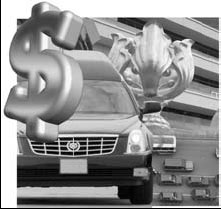Congestion charge needs fresh look
By Hong Liang (China Daily)Updated: 2007-07-10 07:05
Speaking to reporters after stepping down as transport czar in Hong Kong, Sarah Liao talked generally about her achievements and frustrations as an outsider answering the call of public service.
 In one particular interview, she specifically mentioned, among other things,
the bureaucratic stonewalling of her push for electronic road pricing. She
recalled that her senior aides, who were all career civil servants, quietly
advised her to drop the idea because it was supposed to be an "untouchable"
topic.
In one particular interview, she specifically mentioned, among other things,
the bureaucratic stonewalling of her push for electronic road pricing. She
recalled that her senior aides, who were all career civil servants, quietly
advised her to drop the idea because it was supposed to be an "untouchable"
topic.
Liao did not elaborate. But considering the success of similar programs in other cities, notably Singapore and London, it seems inexplicable why the idea is taboo in Hong Kong. Electronic road pricing, as practiced in other cities, is basically a charge on vehicles entering the central business districts during the morning rush hours.
Singapore has had such a system in place for years and nobody seems to have ever questioned its legitimacy. London introduced what it called a "day congestion charge" in 2003, which led to an immediate drop in traffic congestion by almost 20 percent, resulting in an estimated 15 percent cut in carbon dioxide emissions.
Now, the New York State Assembly is debating the merits of introducing such a scheme in Manhattan.
We believe that Hong Kong should at least explore the feasibility of the scheme as air pollution is widely seen to be worsening in the city. What is more, the fees can generate a sizeable income for the government even if traffic in the business district during rush hours is cut by 20 percent. In London, the congestion charge is bringing in about $200 million of revenue a year.
Hong Kong has what Ken Livingstone, the mayor of London, called the "preconditions" for the successful implementation of a "day congestion charge". In a New York Times' column, Livingstone wrote: "In London, as will be the case in New York or any other city, an enhanced public transportation system is critical."
That is not a problem for Hong Kong, which is widely
recognized as having one of the world's most efficient public transport systems,
built around a fast and affordable underground railway, supplemented by a fleet
of air-conditioned and clean buses. 
As is the case in New York, the proposition has met with considerable resistance from retailers and caterers who worry that the congestion surcharge could hurt business. Their counterparts in Hong Kong obviously share the same concern about electronic road pricing.
Based on the London experience, such worries seem unwarranted. According to Livingstone, the retail outlets within the zone subject to the congestion charge have seen "increases in sales that have significantly exceeded the national average". The theater district, which largely falls within the zone, has been doing just as well. "People are still flocking to London - they're simply doing so in more efficient and less polluting ways," the mayor wrote.
It is not clear why some senior officials in the transport department of the Hong Kong government consider the idea of a congestion charge so sensitive that renders it almost unmentionable. The powerful bankers and property barons who have offices in the business center certainly would not mind paying a small charge for the privilege of traveling to work in their private limousines.
Indeed, the scheme has proven to be so successful in London. What works in London, or Singapore, for that matter, does not necessarily work in Hong Kong. But a congestion charge is obviously a scheme worth considering and there is no reason why we should reject it as something "untouchable".
E-mail: jamesleung@chinadaily.com.cn
(China Daily 07/10/2007 page10)
|
|
|
|